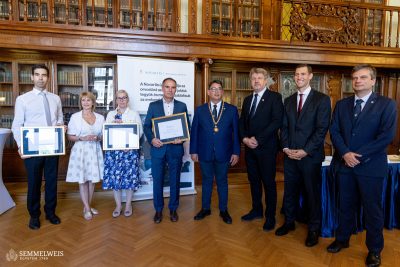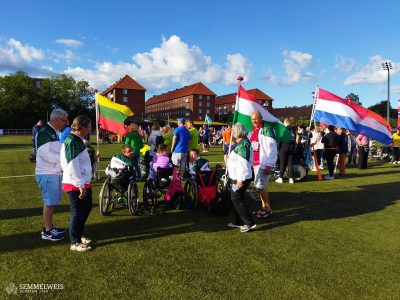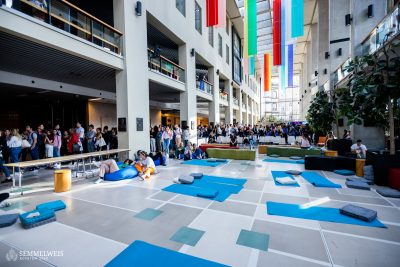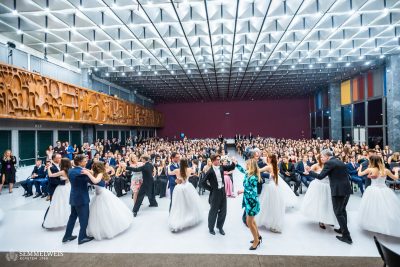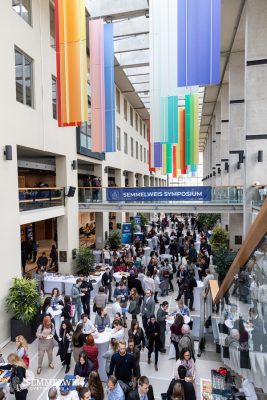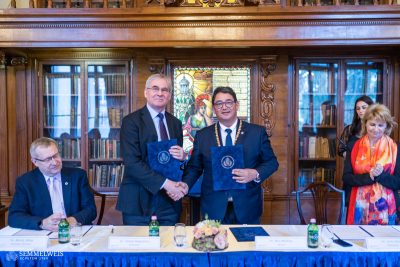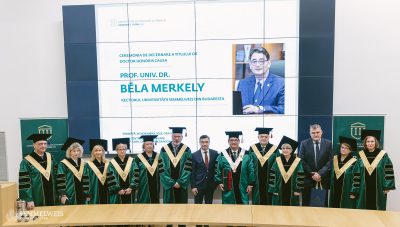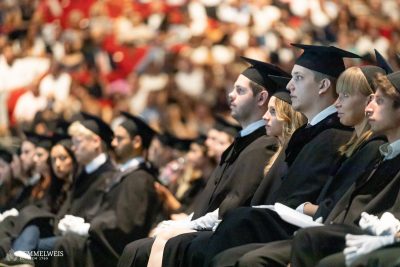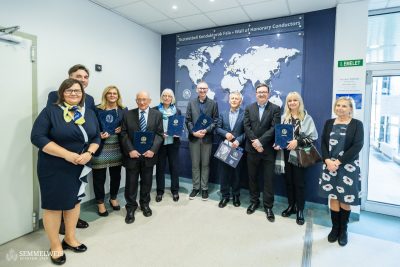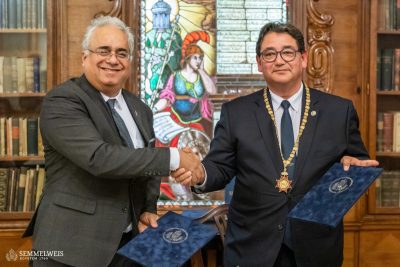Ophthalmic Gene Therapy Centre awarded
Semmelweis University was the first in Hungary to be awarded the internationally recognized “Ophthalmic Gene Therapy Centre” rating. The development was ceremoniously handed over due to a cooperation agreement between the former Ministry of Innovation and Technology, the university and Novartis Hungary.
The treatment centre will be able to use an innovative gene therapy procedure to treat retinal dystrophy, a hereditary eye disease that can lead to total vision loss, so patients will not have to travel abroad for this anymore.
Special centre for limb reconstruction
The Department of Orthopaedics has taken another big step towards becoming a special limb reconstruction surgery centre, where at the beginning of June children with congenital shin joint disease underwent a special and complex procedure unique in the country, in collaboration with the Warsaw-based European Paley Institute, with which the clinic plans to continue its close cooperation. The children who underwent surgery are doing well, but still have many months to go before they are fully recovered.
Gold medals at the Frame Running Cup
In July, the former students of the András Pető Faculty (PAK), athletes of the Pető Sports Association won four gold and two silver medals at the 25th Frame Running International Camp and & CPISRA International Cup.
They took part in the event, held in Copenhagen from 10-17 July, together with their parents, who also played a major role in their training.
Gold medal of the Hungarian football team
Also in July, the Hungarian men’s national football team has won a gold medal at the Medigames, the world games for doctors and healthcare professionals, organized in Portugal. In the final on 9 July, the Hungarians defeated the Norwegian national team of doctors. Semmelweis University was represented in the team by Dr. Kálmán Benke and Dr. Attila Veréb.
Moving up in ShanghaiRanking
In August, the latest, 2022 edition of ShanghaiRanking was published: Semmelweis University has moved up from the places 701-800 (last year) to 601-700 in the global ranking (Academic Ranking of World Universities (ARWU). In the Global Ranking of Academic Subjects, it is also in the top 300 in Medicine, Pharmacy and Dentistry.
Summer University
Between 1-2 September, International Summer University was held at the Basic Medical Science Center (EOK) of Semmelweis University. Lectures, film screenings and round-table discussions on health, higher education, sport and culture were at the heart of the program.
This year, for the first time, the event was organized as an International Summer University, as it was also the opening of the International 40 series of programs celebrating the 40 years of international training.
Opening of the 252nd academic year
The 3rd September, the opening ceremony of Semmelweis University’s 252nd academic year was held in MVM Dome. Rector Dr. Béla Merkely emphasized the importance of humility towards science and respect for predecessors. He also made a special reference to the curricular reform in 2019, which enables more practice-oriented education, and the importance of a prevention-focused approach.
The rector stressed that 40 years ago, in 1983, German- and then in 1989, English-language training was launched, which laid the foundation for the university’s success story since then, as Semmelweis has become one of the most significant English and German-language educational institutions in Europe. At the event, Pro Universitate and Outstanding Teacher Awards were presented.
Freshers’ Ball
The 14 October, the most awaited university event of the newly admitted students came: the Semmelweis Freshers’ Ball. The Theoretical Block in Nagyvárad Square was dressed up for the event that was part of a series of International 40 programs celebrating the anniversary of the launch of international education at the university.
The opening ceremony was attended by nearly 50 international students and the informal part of the event by nearly 200, which is particularly gratifying as the HÖK and the IÖCS continue to open up to foreign students year after year, thus helping them to integrate.
Among the best 250 universities in the world
Also in October, the latest Times Higher Education (THE) World University Rankings has been published: according to that – for the first time – , a Hungarian university is included in the top 250 of the THE world rankings. Semmelweis has improved 41 places on last year’s result.
Traditionally, the World Rankings is based on five areas: teaching, research, citations, industry income and international outlook. Semmelweis has improved in most indicators, most significantly in the area of citations and research. Among the member states of the European Union, Semmelweis is ranked 64th. It has continuously improved its position in THE’s world rankings over the past four years.
Semmelweis Symposium
In November, the 30th Semmelweis Symposium embraced diverse scientific programs, attracting more than 600 participants. Beside the 30th anniversary of its existence, this year’s event also celebrated another round anniversary: the 40th anniversary of launching the institution’s international training program, which is part of the Semmelweis International 40 series.
At the opening session, the Jedrassik Ernő Award was offered to Dr. Attila Szijártó, Director of the Department of Surgery, Transplantation and Gastroenterology.
On the closing day, Dr. Franz Weidinger, President of the European Society of Cardiology (ESC) and Head of the 2nd Medical Department with Cardiology and Intensive Care Medicine at Klinik Landstasse, Vienna was awarded the title of Doctor Honoris Causa.
Cooperation with the Hungarian-American Fulbright Commission
In November, a cooperation agreement was signed between Semmelweis University and the Hungarian-American Fulbright Commission. Under the agreement, Semmelweis University will host two English-speaking American lecturers every year starting the next academic year.
The university will also be able to host lecturers, students and language tutors outside the framework of the scholarship. The visiting professors will participate in the work of the university for one semester, as a Fulbright scholar visiting lecturer. During this period, they will teach a course, be involved in the research activities of the university and participate in Fulbright events.
Semmelweis scientists among the highly cited researchers
Also in November, the list of the most cited researchers has been published: this year four Hungarians, including two professors from Semmelweis University, have been included. Dr. Péter Ferdinandy, Vice-Rector for Science and Innovations and Dr. Balázs Győrffy, Head of the Department of Bioinformatics are the authors of publications that are in the top 1 percent of the most cited in their fields.
The Web of Science, a multidisciplinary international scientific database, lists a total of 7,000 researchers from around the world.
Dr. Béla Merkely awarded in Iași
In December, Rector Dr. Béla Merkely was awarded the title Doctor Honoris Causa at Grigore T. Popa University of Medicine and Pharmacy (UMF) in Iași, Romania. He became an honorary citizen of the city as well.
At the ceremony the rector spoke about the vision of a closer partnership, promising that he will do everything for further strengthening our partnership and supporting their institutions’ efforts to become among the scientific elite of Europe and the world. He also pointed out that according to the Web of Science Core Collection database the two universities have 25 joint publications so far.
Cooperation with Harvard Medical School
The 13 December, the leadership of Semmelweis University signed a letter of agreement with Harvard Medical School. Under the terms of that, Harvard Medical School Postgraduate Medical Education (HMS PGME) will design and deliver an educational program in the field of clinical research for Semmelweis University. HMS’s Central Europe Clinical Scholars Research Training program will kick off in July 2023 and run through June 2026.
Semmelweis University will contribute 50% of the tuition costs for fifty participants in each annual program, or $250,000 per year for this purpose. The program is also open to candidates from neighbouring countries in the Central and Eastern European region.
Rita Kónya, Gábor Kiss
Photo: Attila Kovács, Bálint Barta – Semmelweis University
